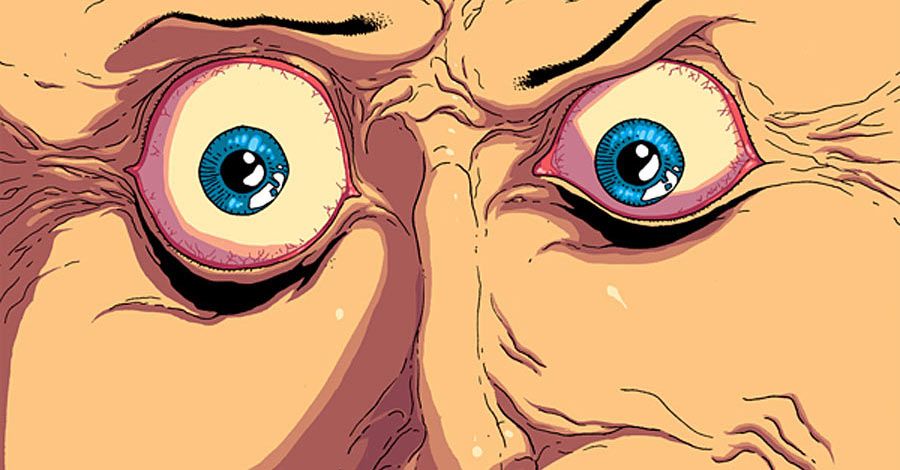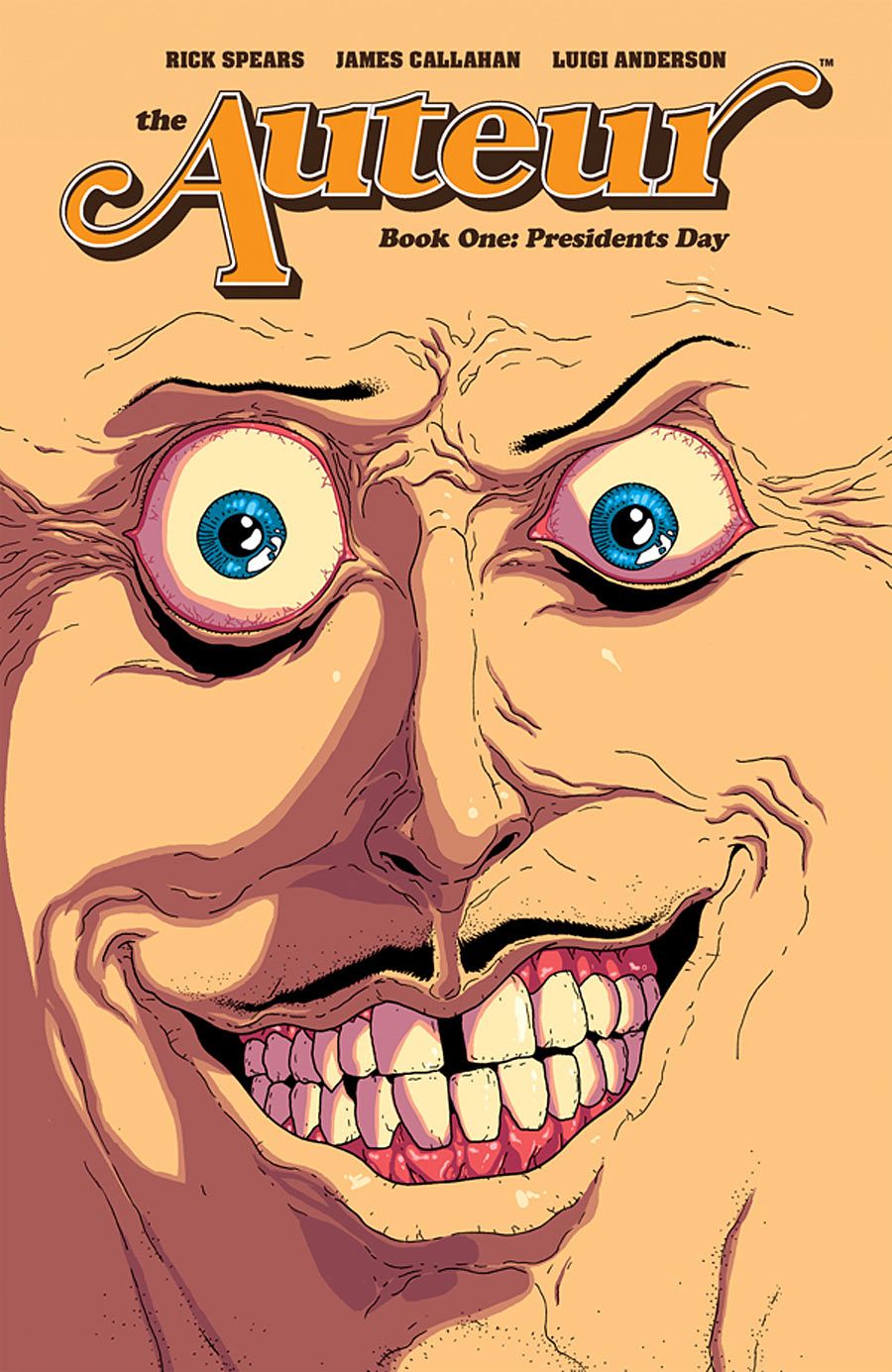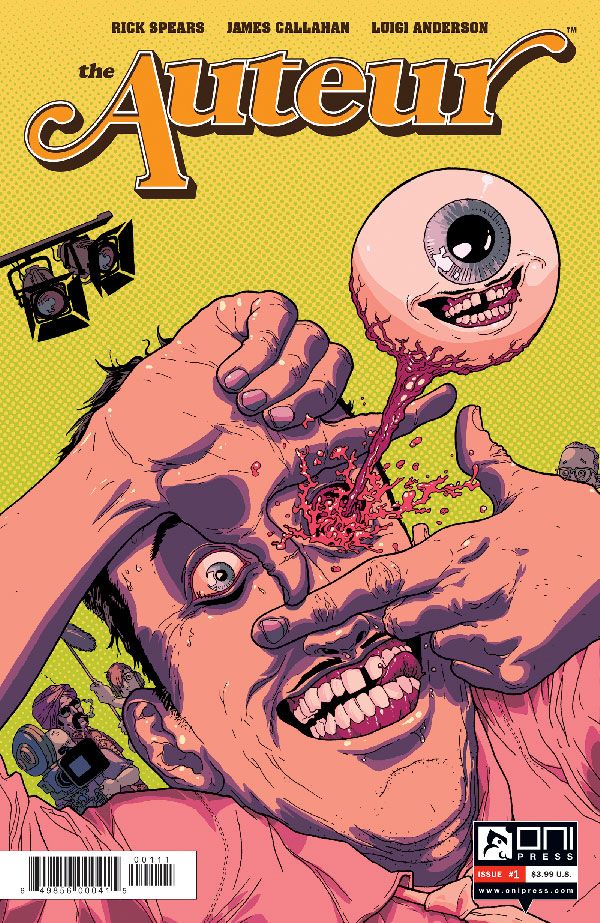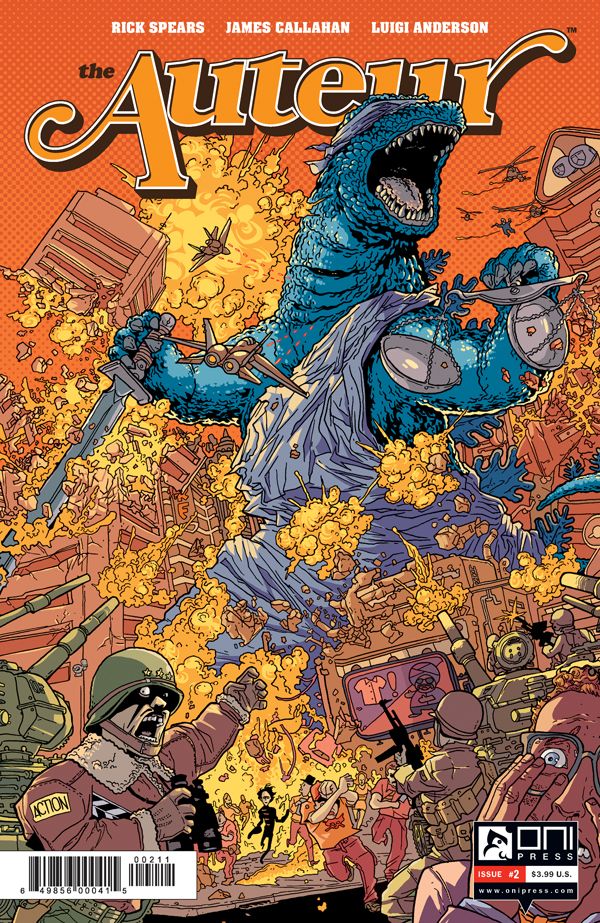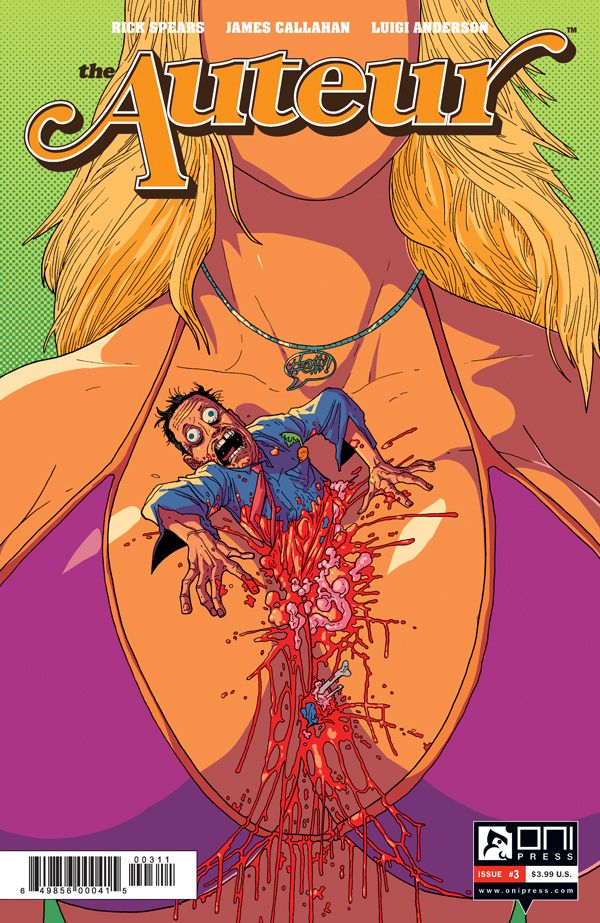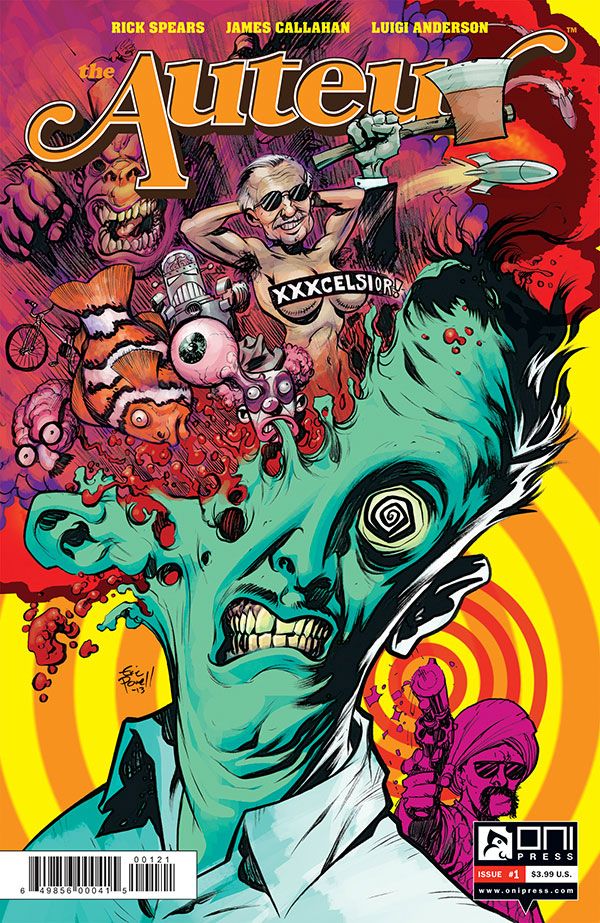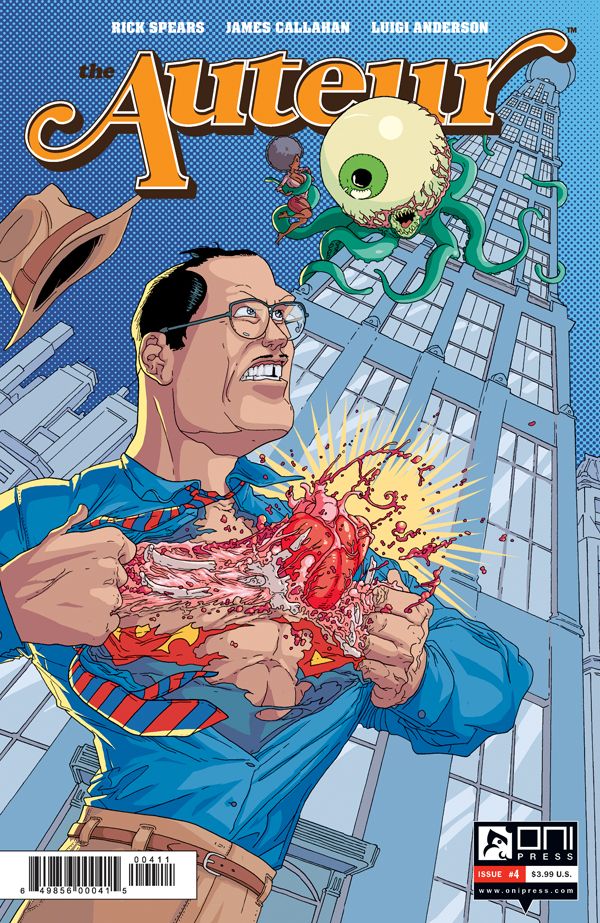"The Auteur" debuted earlier this year from Oni Press, and quickly distinguished itself as one of the most unique -- and tricky to properly describe -- ongoing comics series on the market. Written by Rick Spears and illustrated by James Callahan, the series depicts disgraced movie producer Nathan T. Rex's hallucinatory quest to rebound from a historic Hollywood flop.
Spears, whose past work includes "Teenagers from Mars" and "Black Metal," recently discussed "The Auteur" with Kieron Gillen, in the latest installment of "The Wicked + The Divine" writer's "Decompressed" podcast. Gillen started "Decompressed" in 2012, as a series of in-depth chats with fellow creators about the creative process.
Courtesy of Oni, CBR has the exclusive debut of Spears and Gillen's episode of "Decompressed," featuring talk of pitching "The Auteur," the "brilliant genius" of Callahan, panel counts, vomiting, nudity and the question of "what the Hollywood people think of a book about Hollywood." The file is available to stream via the SoundCloud player, and a transcript of excerpted highlights follows below.
Kieron Gillen: So I've got a really basic question I want to ask about "The Auteur." How the hell did you pitch this?
Rick Spears: [Laughs] I get that a lot. Charlie Chu over at Oni Press and I are good friends. I knew him even before I started working over there. I met him on the Warren Ellis Forum, way back when and I guess we first hung out at San Diego Comic-Con with Laurenn McCubbin. So we'd been friends for a while and he started working at Oni and took over the duties of editing the "Black Metal" book that I do with Chuck BB. We started talking about what was next and I pitched him a couple of different things. We couldn't settle on something, and "The Auteur," which was originally called "Mondo," was this idea I had, and I gave sort of a soft pitch -- not as extreme as it was going to be -- like, it's about this guy and he's making a movie and he's struggling and originally he did turn it down. But I just kept talking about it because we'd have to talk about the other book and I'd just sort of constantly bring it up and add new ideas to it. One day, he was like, "Dude, if we're gonna be serious about this book, you've gotta send me an outline sooner or later!" and I was like "O... OK," so I just sent in an outline and all of a sudden we were working on it. I think we kind of skipped the actual approval process.
I knew I wanted to work with Jim Callahan. He lives here in Richmond, Virginia and we've been buddies for a long time as well. He's just a really special artist and I knew that with what I wanted to do in the script, he was the only guy who could really pull it off. It was funny because Oni was worried about Jim, too! They weren't 100 percent sure about his art, but I was just like, "Shut up, don't worry about it. Let us get going on it and you'll see what he's going to do." And now they think he's a brilliant genius, so...
Gillen: I couldn't imagine anyone else doing what he's doing here, you know? That element of demented energy in every panel is utterly important.
Spears: Yeah! And I definitely write to his strengths. I know what he can do really well and we talk a lot about the book. Like the big spread in issue #1 with the axe and the exploding brain -- I knew I wanted to come out swinging at get some attention from whoever's flipping through the book, just stop them cold, and I knew Jim would just destroy that page. Rob G and I used to always talk about how with comics, the art got people to pick them up, but it was the writing that got them to stick around, so I wanted to make sure we had some show-off art right there in the beginning.
Gillen: When people are pitching to places like Image and asking about how a cold pitch would work, it's always like, "If they don't like your artist, you're fucked." In a really very basic, practical way, that's it, isn't it?
Spears: Yeah, absolutely. Comics is a visual medium. The first thing that happens is they see it, before they can even read it, and if the art's turning them off, you're already dead.
Gillen: I'm looking at the first page and I'm really loving the colors as well. How did you know the colorist?
Spears: That was Luigi Anderson, who was still in school when we found him. James Lucas Jones had gone down to SCAD in Georgia to a student show and met a bunch of different artists, and he was one that they'd suggested. I really like Luigi because I said, "Look, there's all the rules and all the ways to color stuff and what they're teaching you. I want to do the opposite of that. I don't want it to look realistic, I don't want to worry about there being too many colors on the page." I wanted it to be sort of like what we did in "Pirates of Coney Island" where it's like you've been eating sugar all day and now you're being spun by some roller coaster and you're getting nauseous. That's the feeling I wanted to get out of the coloring. And to his credit, Luigi really went for it. We actually looked at a few colorists and had some people try out, but he was the only one that really jumped in with both feet and went nuts. He was a really great find and really got into it.
Gillen: I keep using the word "demented" which is probably ableist and problematic, but it's frenzied, which is the main tone you get from the book, which is very deliberate. Talk about the coloring in the first panel for a second -- even in that one panel alone you get that not-quite-hot pink, kind of a sickly pink and then you've got the green with it as well. Even that one panel alone is something, without even taking in the rest of it.
Spears: Exactly. I needed it to be weird and unsettling -- sort of jarring right from the beginning.
Gillen: Weirdly, it's just reminded me of "Songs About Fucking" by Big Black. Sort of that color scheme. But that might just be on me.
Spears: You know, it's funny, I never thought of that, but we actually have the poster of that in "Teenagers from Mars."
Gillen: Hell of an album.
Gillen: Where did Nathan T. Rex come from?
Spears: To some degree, he's me. He's the me I don't let anybody see. He's terrified. He's terrified everyone's going to realize he's a fraud, but at the same time, he is trying. Where a lot of people would lock up, he's really going for it. He's also a lot of Jim, which is funny because -- I'm sure all artists do this -- but Jim's got sort of a busted pinkie from skating and Rex's pinky's a little busted, because Jim's obviously looking at his own pinky when he's drawing.
And then of course you can go through the list of directors: Ed Wood, John Waters, Jess Franco, a sort of hodgepodge of those. Ultimately I'm always writing about myself and my experience times a thousand.
Gillen: Have you ever barfed on your own dick? [Laughs]
Spears: You know, I haven't, but I do throw up a lot.
Gillen: Oh, wow.
Spears: Yeah, it's kind of my favorite thing to do, apparently. I've got a wonderfully crap stomach and that's actually how I make a lot of friends at conventions! [Laughs]
Gillen: [Laughs]
Spears: You're sort of burning the candle at both ends and drinking too much and eating shit food and staying up all night and eventually I'm throwing up somewhere and that's how I meet people! [Laughs]
And Jim knows that, and he likes to mess with me about it, so, you know. There's always a lot of throw up in my stories.
Gillen: The amount of hallucinations in "The Auteur" is somewhat overwhelming, and I don't mean that in a bad way. I'm trying to think of any character we're close to that hasn't. We're even to the point where the characters don't know what's real and isn't. The juxtaposition of reality and fiction is one of the book's big themes, I'd imagine. Would you agree with that?
Spears: Very much so. Going back to "Teenagers from Mars" again, we had this argument because it was something where a full moon happened in issue #1 and then in issue #3 or something, there was another full moon. Rob said "No, no, no, this is two nights later, it can't be a full moon, it's got to be waning or waxing or whatever it does," and I said "No, no, no. It's always a full moon. On Mars it's always a full moon and there's always bats in front if it any time we see it." He said "But that doesn't make any sense," and I said "I don't care. That's what's gonna look right." And he sort of got into it with me and so "The Auteur" is that plus much, much more.
When we started out, I needed to help people, I think; just sort of give the reader a road map of what we were doing. So at first, it's the drugs and he's dreaming and using these more easily understood ways to get into that less realistic space. That's something I'm really interested in as I'm moving forward and sort of solidifying the grammar of the book, so we can get away from motivating the hallucinations. So it just becomes more of how the characters interact. That's something I'm interested in seeing if I can get a way with. Stuff really gets less and less realistic, but still you're able to understand what's going on and not get lost. I like not reality [Laughs] I think it's very interesting.
Gillen: I'm flipping through as we're talking. I'm looking at the end of issue #3, that whole sequence on the boat? With the ghost and feeding the sharks, and the vomit looks like a poltergeist thing? "I'm not scared of you, Cthulu!" It's a tour de force of this kind of crazy shit.
Spears: Issue #1 was sort of the setup. It establishes everything. I wanted to make each issue not a standalone, but very different from the one before it. So issue #2 becomes a courtroom drama, which I thought would be interesting and sort of different, again, because there's no moviemaking in that one at all, for a book about a movie guy. And then there was the third one.
When we got to that boat scene, Charlie, Jim, and I realized what "The Auteur" really is. That final scene on the boat was where it all started to sort of work without us fighting so hard to make it work. So that's probably one of my favorite parts of the book.
Gillen: Do you have a favorite issue? Because they do have their own sort of tonal feelings and each one does its own thing.
Spears: I like the ax to the face at the beginning, and I like the end of issue #3. My favorite moment is probably in issue #3 when Rex is convincing her that she has to get naked. [Laughs]
Gillen: [Laughs]
Spears: Because he's giving her this big speech about making great art, but it's just about seeing her titties so they can make money. That's something I struggle with a lot, especially with comics, you know? Trying to sell comics, but also making comics that I think are interesting is in conflict a lot, so that's part of that discussion right there. Making something that I think will appeal to a lot of people in a certain way, but also to a few people in maybe a more important way. And of course, I really like the ending in the movie theater there. I was really excited with the way Jim was able to pull it off.
Gillen: Issue #3 is one of the more interesting ones in that way. That's the one where I was kind of like "Where are we going? Oh my god, Rick." There's an opening with a beautiful six-panel grid effect and I'm a fan of steady angle, repeat grid with punchline structure. Which says a lot about the objectification and the rest of it.
Spears: You mean all the boobies? [Laughs]
Gillen: That's what I mean, yes. [Laughs] You're speaking to me and I have to dance around everything. That's a very formally rigorous way of doing this, which is surely the point.
Spears: I knew I wanted to have the big double-page spread of the boobs because again, it 's that think where having nudity for the sake of having nudity to try to sell a comic to people that would like nudity in a comic is sort of part of the point. But then the other part was to make it ridiculous enough for people that would maybe be offended, that it would be like "Wait a minute. This is so ridiculous. It's not about boobies, really." It's almost more about that whole idea. So, I knew I wanted to have the big double-page spread because that would be ridiculous and then I thought "What the hell do I do for page one?"
So I went through a couple different versions of setting it up and I was like "Nah, it's just gotta be a more boobs." [Laughs]
Gillen: [Laughs]
Spears: That would be worse, you know? It'd just sort of push the idea even further than just the double-page spread, because now we're doing three. And I really like the grid, too. I think a lot of people think that doing a more modern way of paneling a page is interesting, but there's something the grid requires in storytelling that I think is really interesting. It's just so clean. The ideas go straight in as opposed to having to "read" the page in a different way. It's just sort of happening, you know? [Laughs] I'm explaining it terribly!
Gillen: No, you're not! It's like there's a sort of minimum of processing required so you can lose yourself in the world, maybe?
Spears: Yeah, and going back to filmmaking, the film frame is always that exact same size, over and over again. So on the comic book page, when the frame's the same size, you're just moving through the information almost more like a film frame, which I love. Like in "The Dark Knight Returns." That's one of my favorite parts about that book, and "Watchmen" does it, too, but I like it better in "Dark Knight." The way he uses that 16-panel grid. It's just brilliant, and very few people use it. You see it every now and then, but it's just such a formal requirement; and that book is just so dense because of it. There's so much information on the page that it almost reads longer than it is.
Gillen: That's something I do as a creator. When I read an issue that seems long, I do the panel count. I'm anal enough to do that. See how many panel progressions they require to get that effect. Sometimes I'm genuinely surprised, especially if a relatively low panel count reads longer. But quite often, it's looking at where the squeezed in more space. That's comics, you know?
Mine was 8-panel. I love 16-panel, but no one uses it. I don't know if I've ever been brave enough to ask an artist, because they might attack me. Even 9-panel is pushing it. I'm always pleased when someone gets a 9-panel. The effect is widescreen. For me, that's how you see the world. It's a cinema screen and you have more peripheral vision than up-down vision, in that way. I fell in love in that way with "Stray Bullets," this kind of world where no one has any feet ever.
Spears: I wonder if he just doesn't like drawing feet, maybe.
Gillen: I don't think Jamie [McKelvie] likes my eight panels, but he's very good at them. He gets to draw a lot of them.
Spears: Yeah, the only time I like to go for fewer panels is when you need that sort of bigger moment, where it just needs the bigger image to sort of set the location or let it sink in. Or, I love the double-page spread for a small moment. It's almost the opposite. [Laughs]
Gillen: At least in mainstream comics in the last decade, that space equals importance. The fact that I've been doing so much superhero and mainstream stuff, some of that's actually gotten in my head a bit, and now getting outside of that when doing certain types of work, is something I've got to explicitly tell myself. I was doing this crossover with Matt Fraction called "Everything Burns," and there's a bit where a character called Loki -- [Laughs] a character called Loki, as if anyone listening to this doesn't know who Loki is. Loki's been good up to this point, but he says he might be evil. Originally it was one panel on a seven-panel page, and Fraction was like, "No, they're never gonna believe he means this unless you emphasize him," so I rearranged the story so it became a splash page. That's kind of the grammar I think people have learned, and when you move outside that grammar, instantly you make a comic that feels very differently to that.
Spears: Yeah, totally. I'm doing a "Carnage" tie-in to Rick Remender's "AXIS" crossover, and all the pages are four and five panels and it's a different read, you know? Especially because for superhero stuff, those big superhero moments work with less panels, I think.
Gillen: Yeah, which is often depressing. I find myself getting depressed when I write a three-panel page and it works so well. And I'm like "Oh, God.." All that clever stuff you're trying and it's like "Three panels, let them draw what" --
Spears: I do like the two-panel. Either a big panel with a small one at the bottom or a small one with a big one, sort of a --
Gillen: One-two.
Spears: Yeah, something about that sort of gives you your moment with the small one but you get the sort of --
Gillen: Storytelling of it?
Spears: Yeah, the gravitas of the bigger panel.
Gillen: What I quite like is the bookendiness of it. Talking about "Teenagers" being a screenplay that came to comics because it was about comics. This is, of course, a comic book about the movies, which could almost certainly never be a movie.
Spears: Oni have definitely had some success with "Scott Pilgrim" and all that, so I'm definitely curious to see as they push it up on that side of things what the response is.
Gillen: I think Charlie almost said something as much in the back [of issue #1], that it doesn't feel like a movie pitch.
Spears: This is something I believe very strongly. I don't like the idea of making one thing to try and get to that other thing. Like making your comic to try and get a movie deal. When I was doing "The Auteur," and with any of my projects -- except Teenagers, because that was beforehand -- I'm not trying to make a movie deal, I'm just trying to push myself as a comic book writer, and if someone wants to option it or whatever, then sure. It'd have to be different as a movie. It just wouldn't work the same. Like the boobies on issue #3. How do you do a double-page spread of boobs? It just wouldn't be the same feel. Maybe we'll just have 3D for a minute.
Gillen: Everyone has to gather around a TV in the front and then you move the image up to the big IMAX screen, and have three multiple screens. That's the way I'd do it. There's a reason I don't work in movies.
Spears: [Laughs] Yeah, I don't know. We'll see what happens. Like the director, I was sort of joking and said "he should look like Zack Snyder!" because he always has that hat. Every picture I've seen of him, he's got this gigantic director's glass, which you need, you know, for the shots that they do, but yeah, it'd be interesting to see what the Hollywood people think of a book about Hollywood. I haven't heard yet.
"The Auteur Vol. 1" will be available later this month from Oni Press.

